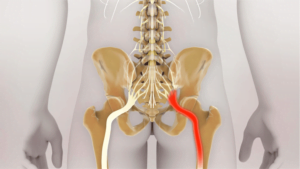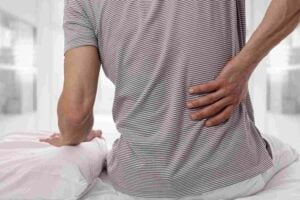With each passing day, we are discovering new links and associations between seemingly unrelated health conditions. One such intriguing connection is between sciatica, a common condition affecting the sciatic nerve in the lower back and legs, and constipation, a prevalent digestive issue. This blog post seeks to explore the intriguing link between sciatica and constipation, discussing their shared causes, potential implications, and practical strategies to manage these intertwined conditions effectively.
Contents
Can Sciatica Stop Bowel Movements?
 Sciatica itself is unlikely to directly stop bowel movements. But it can contribute to symptoms that might make bowel movements more difficult or uncomfortable.
Sciatica itself is unlikely to directly stop bowel movements. But it can contribute to symptoms that might make bowel movements more difficult or uncomfortable.
Sciatica refers to pain that radiates along the path of the sciatic nerve. It branches from the lower back through the hips and buttocks and down each leg. This pain is typically caused by compression or irritation of the nerve.
Here’s how it could indirectly affect bowel movements:
- Pain and Discomfort: The pain and discomfort associated with sciatica might make it difficult to find a comfortable position to facilitate bowel movements. The strain could make the process more challenging.
- Medication Side Effects: Some medications used to treat sciatica, such as certain pain relievers, can cause constipation. If you’re taking medication for sciatica, this could indeed affect your bowel movements.
- Reduced Physical Activity: If sciatica is limiting your mobility, the reduction in physical activity can lead to constipation. As regular exercise often helps to promote healthy bowel movements.
- Psychological Factors: Chronic pain conditions like sciatica can sometimes lead to anxiety or depression. Both might affect the gastrointestinal system, including bowel movements.
- Rare and Severe Cases: In very rare cases, a severe condition known as cauda equina syndrome (CES) can develop, often due to significant compression of the nerve roots. This syndrome can include symptoms such as loss of bowel control. It’s essential to note that CES is a medical emergency, requiring immediate attention.
So while sciatica itself doesn’t necessarily stop bowel movements, the other reasons can indeed lead to challenges with bowel function. Always consult with healthcare professionals who can evaluate and manage these symptoms based on your unique situation.
What Nerve Controls Constipation?
Bowel movements and constipation are controlled by a complex interplay of nerves within the autonomic nervous system. The two primary parts of the autonomic nervous system involved in bowel movements are the sympathetic and parasympathetic systems.
- Parasympathetic Nervous System
This part of the autonomic nervous system promotes digestion and bowel movements. The main nerves involved in this process are the vagus nerve (cranial nerve X) which innervates the upper part of the colon, and the sacral nerves S2-S4 which innervate the lower part of the colon and rectum.
- Sympathetic Nervous System
This part of the autonomic nervous system can inhibit digestion and slow down bowel movements. This is contributing to constipation. The main nerves involved are the thoracolumbar sympathetic nerves.
When the balance between these two systems is disrupted (due to disease, injury, stress, or certain medications). Then, it can lead to a variety of gastrointestinal problems, including constipation.
It’s also worth noting that the enteric nervous system, often referred to as the “second brain,” is a part of the nervous system that specifically governs the function of the gastrointestinal tract. This system can operate independently of the brain and spinal cord. But it also communicates with the central nervous system. Problems with the enteric nervous system can contribute to constipation as well.
What Are The Symptoms Of Sciatica And Constipation?
 Sciatica and constipation each have distinct symptoms. It’s essential to note that while these conditions can coexist due to various reasons (like lifestyle factors or medication side effects), they are usually separate issues. Here are the typical symptoms for each:
Sciatica and constipation each have distinct symptoms. It’s essential to note that while these conditions can coexist due to various reasons (like lifestyle factors or medication side effects), they are usually separate issues. Here are the typical symptoms for each:
Sciatica
Sciatica is a condition characterized by pain following the path of the sciatic nerve, which is the longest nerve in your body, running from your lower back, through the buttock area, down the back of your legs, and to your feet. Symptoms often occur on one side of the body and can include:
- Lower back pain
- Pain in the rear or leg that is worse when sitting
- Hip pain
- Burning or tingling down the leg
- Weakness, numbness, or difficulty moving the leg or foot
- Constant pain on one side of the rear
- A sharp pain that may make it hard to stand up or walk
Constipation
Constipation is a common digestive condition where individuals have infrequent bowel movements, difficulty passing stool, or the sensation of incomplete evacuation. Here are the typical symptoms:
- Passing fewer than three stools a week
- Having lumpy or hard stools
- Straining to have bowel movements
- Feeling as though there’s a blockage in your rectum that prevents bowel movements
- Feeling as though you can’t completely empty the stool from your rectum
- Needing help to empty your rectum, such as using your hands to press on your abdomen and using a finger to remove stool from your rectum
If you’re experiencing any of these symptoms, it’s important to seek medical advice. Both sciatica and constipation can have a range of underlying causes, some of which require specific treatments. In some cases, these symptoms can indicate a more serious condition that needs immediate attention.
 Sciatica and constipation, while fundamentally different conditions affecting separate systems of the body, can indeed share some common triggers. It’s essential to remember that correlation does not necessarily imply causation. And an individual can have sciatica and constipation concurrently due to entirely separate reasons. However, understanding these shared triggers can offer insight into a more holistic management strategy.
Sciatica and constipation, while fundamentally different conditions affecting separate systems of the body, can indeed share some common triggers. It’s essential to remember that correlation does not necessarily imply causation. And an individual can have sciatica and constipation concurrently due to entirely separate reasons. However, understanding these shared triggers can offer insight into a more holistic management strategy.
Sedentary Lifestyle
Lack of regular physical activity can contribute to both sciatica and constipation. Regular movement helps keep the muscles of the back and abdomen strong, reducing the likelihood of sciatica. It also helps stimulate the muscles in your gut and speed up digestion, reducing the risk of constipation.
Dehydration
Proper hydration is crucial for the healthy functioning of the digestive system. Chronic dehydration can lead to constipation. Additionally, it can contribute to disc degeneration in the spine. This could potentially lead to sciatica.
Poor Diet
A diet low in fiber can lead to constipation. Moreover, certain dietary deficiencies might contribute to nerve pain or inflammation, potentially triggering sciatica.
Medication Side Effects
Some medications, especially certain types of pain relievers, antidepressants, and iron pills, can lead to constipation. Likewise, some medications used to treat conditions such as high blood pressure or mental health issues can contribute to nerve damage and potentially sciatica.
Obesity
Excess body weight puts extra stress on the spine. This can contribute to the spinal changes that trigger sciatica. Obesity also increases the risk of constipation.
Stress and Mental Health
Psychological stress can contribute to various physical conditions, including both sciatica and constipation. Chronic stress can cause muscle tension and inflammation, potentially leading to sciatica. It can also disrupt the digestive system, leading to constipation.
Advanced Age
Aging is associated with an increased risk of both constipation (due to slower metabolism, decreased gut motility, and often changes in diet and activity levels) and sciatica (due to wear-and-tear changes in the spine).
If you’re struggling with both sciatica and constipation, a multifaceted approach to treatment that considers these shared triggers may provide the most effective relief. Always consult a healthcare provider for personalized advice.
How To Cope With Sciatica And Constipation?
 Coping with sciatica and constipation involves a combination of medical treatments, lifestyle changes, and home remedies. While both conditions are separate, some measures can help alleviate both. Here are some suggestions:
Coping with sciatica and constipation involves a combination of medical treatments, lifestyle changes, and home remedies. While both conditions are separate, some measures can help alleviate both. Here are some suggestions:
1. Medical Treatment
- Sciatica: Depending on the severity, sciatica treatment might include pain relievers, muscle relaxants, anti-inflammatories, physical therapy, or even surgery in severe cases. Always take medications as directed by a healthcare provider.
- Constipation: Over-the-counter laxatives or prescription medications can help with constipation. It’s crucial to use these products as directed and not rely on them for long-term management without consulting a healthcare provider.
2. Lifestyle Changes
- Diet: A healthy diet can assist with both conditions. For constipation, increase your intake of dietary fiber found in fruits, vegetables, and whole grains. Stay hydrated by drinking plenty of water. For sciatica, consider a diet rich in anti-inflammatory foods like leafy greens, berries, fatty fish, and nuts.
- Exercise: Regular physical activity can help maintain a healthy weight, strengthen the muscles supporting your spine, stimulate your bowels, and manage stress. Gentle activities like yoga and walking can be beneficial.
3. Home Remedies
- Heat and Cold Therapy: Applying heat and cold can help manage sciatica pain. Cold can reduce inflammation, while heat can relax the muscles.
- Positioning: For sciatica, try to find comfortable positions that alleviate pressure on the sciatic nerve. For constipation, a squatting position or using a footstool to elevate your knees while on the toilet can help align the colon for easier passage of stool.
- Relaxation and Stress Management: Techniques like mindfulness, meditation, and deep-breathing exercises can help manage the stress that often exacerbates both sciatica and constipation.
- Pelvic Floor Exercises: For some people, constipation can be related to a dysfunction in the muscles of the pelvic floor. Exercise to strengthen these muscles may be helpful.
4. Alternative Therapies
- Massage: This can help to relieve muscle tension and reduce sciatic pain.
- Acupuncture: Some people find relief from both constipation and sciatica through acupuncture, though more research is needed to confirm these effects.
Remember to reach out to your healthcare provider before starting any new treatment or regimen. It’s also important to seek immediate medical attention if you experience severe or worsening symptoms.
Conclusion
In conclusion, the intersection between sciatica and constipation provides valuable insights into how interconnected our bodily systems are. While these conditions primarily affect different systems – the nervous and the digestive – they share common triggers and lifestyle factors that can exacerbate both. Therefore, a holistic approach to managing these conditions can lead to more effective and sustainable relief.
Remember, every individual’s situation is unique. So personalized advice from healthcare professionals is essential for the best outcomes. Exploring the link between these two conditions underscores the importance of comprehensive healthcare. If you’re experiencing Elbow pain, physical therapy for elbow pain at PhysioMantra can help: Book an online physical therapy session.



